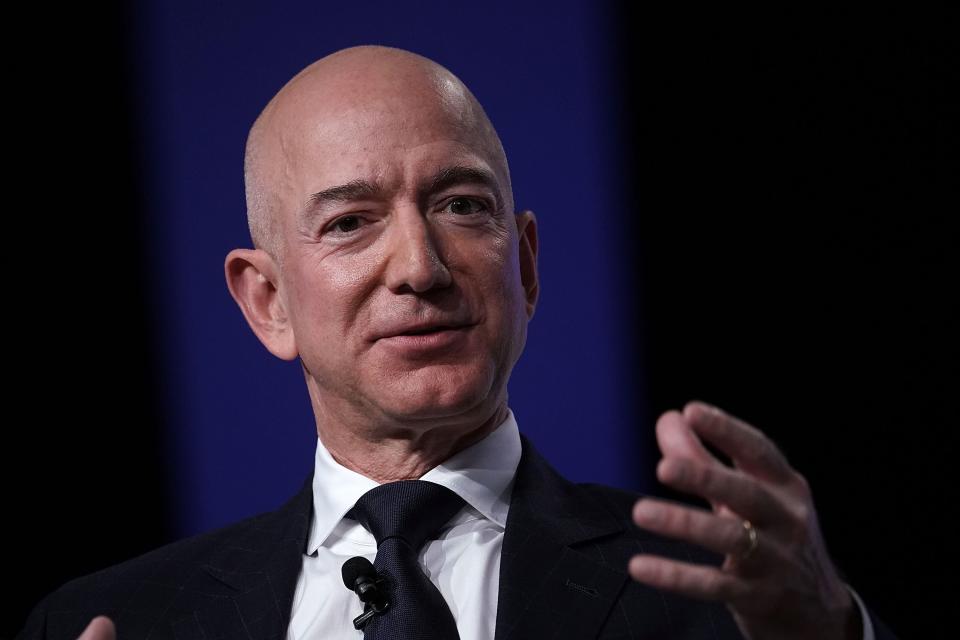Jeff Bezos could be the new Bond villain – and he has cinematic domination in his sights

Cinemas have been hard-hit by the pandemic. They’ve moved from the centre stage to the shop window, but shop windows still matter
(Getty Images)On the day Britain’s silver screens flickered back into life after a prolonged and painful absence, the latest episode in the blockbuster Stream Wars saga was playing out across the Atlantic.
US telecoms company AT&T has spun off Warner Bros, one of the “big five” Hollywood studios, and its other media businesses including streamer HBO Max, via a merger with Discovery, named for the famous documentary channel.
They’re something of an odd mix. Discovery specialises in lifestyle content, cookery shows, travel, documentaries and especially low-cost reality TV. WarnerMedia, by contrast, is an entertainment aristocrat. But AT&T, which will still have a big stake in the combo, couldn’t make the company sing in the streaming era after splurging $109bn on it and this offers a way out for the telecoms giant, which is in retrenchment mode.
The challenge that the new combination, which has a decent subscriber base but remains a relative small fry when compared to Netflix or Disney Plus, faces was writ large as reports emerged that the mighty Amazon was in talks to acquire MGM. The latter lacks a deep pocketed owner and has been hit hard by the pandemic.
A deal with Amazon would deliver the Bond franchise into the hands of what is, for its critics, a corporate Spectre. Jeff Bezos’s baby would also oversee the “Rocky/Creed” franchise and get its hands on a vast library of classic content, too. MGM’s credits include such gems as North by Northwest, Singin’ in the Rain, Ben-Hur and Annie Get Your Gun.
If the Discovery/Warner deal is Stream Wars: A New Hope, MGM/Amazon sees the empire striking back with some fancy new weaponry for the ultimate corporate death star.
There will be losers from this multi-billion dollar corporate gold rush, which has seen a wall of money washing over the entertainment industry. Amazon will not be among them. It is Rocky Balboa, Apollo Creed, Adonis Creed, Ivan Drago and Clubber Lang all rolled into one.
Does this leave embattled cinema owners as a sideshow, fated to be washed away like everything the CGI geniuses put in the path of the Colorado River when the Hoover Dam was destroyed in Warner’s hokey San Andreas? Not necessarily. They’ve moved from the centre stage to the shop window, but shop windows still matter.
Disney, and Warner/HBO Max, have pushed some of their content direct to streaming through the course of the pandemic. The results have been mixed. It’s notable that Disney’s Raya and the Last Dragon came out both via a “premium” Disney Plus release, requiring a subscription plus an additional fee on top, and through cinemas.
This was not the case with its big-budget live-action remake of Mulan in territories like Britain, even though cinemas were open and crying out for new content to tempt customers at a time when they were largely left showing vintage movies.
The holy grail for streamers is actually a hit TV series, because a series keeps a hold of the viewer’s attention (and thus their money) for much longer. But in an atomised pop culture, only a very small number of those can match the cultural clout of a big name movie.
Theatrical releases are important to the latter not just because of the role they play in defraying the high production costs incurred by blockbuster flicks. They also provide visibility, buzz and credibility if they pass muster with audiences. They help draw the streaming eye, and thus the subscription dollar. The money being thrown at streaming puts a huge premium on the subscription dollar.
This is comforting for those of us still hankering after the immersive experience of spending a couple of hours in a dark room with a huge screen, sans devices (hopefully) and other distractions.
But can these shop windows survive? The big chains loaded up on debt to keep them going while they were shuttered. There is a substantial backlog of big-ticket releases – including as many as four Marvel films – that could normally be counted on to draw in custom over the next 12 months.
The trouble is, it isn’t just a matter of having the requisite content. Cinemas also face the challenge of restoring the confidence of the pandemic-cautious customer. If they can’t do that quickly enough, they may find themselves hurtling towards a tipping point. The results won’t be pretty.
Is the next step for the streamers to buy them out of bankruptcy? The idea has been dismissed by sceptics and there’s a potential complication with antitrust issues in the US. But it’s surely one possible outcome?
Alexa: I fancy a trip out. What’re you showing at the local Amazonema?
Read More
UK weather: The latest Met Office forecast
This is what we do about anti-vaxxers: No job. No entry. No NHS access
The world today resembles the Cold War years – but smaller states are becoming evermore powerful

 Yahoo Finance
Yahoo Finance 